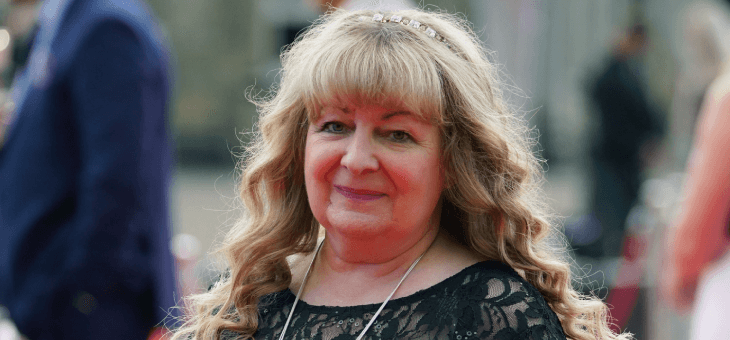Comedian Janey Godley shared an honest update on Facebook this week, about accepting how she “may be facing death”.
The 61-year-old Scottish comic, known for stand-up and appearances on Have I Got News For You, as well as her hilarious viral videos during the pandemic, was diagnosed with ovarian cancer last year and underwent a hysterectomy in January. Afterwards, however, Godley revealed she’d been told her cancer had spread and she faced further treatment.
She recently shared a Facebook post that read: “I think I’ve had an epiphany, I have been resisting the fact I have a life threatening cancer … I have tried to ‘fight and be strong’ instead of accepting that this whole year I just may be facing death or survival of something I have no real control over.”
The comic added: “I appreciate all the amazing support and I believe my mental health will improve if I just lean into the fact that this cancer is happening. I am not alone, millions of people survive this disease and living with it isn’t a failure – maybe I don’t have to fight everything that happens to me and trust the science?”
View this post on Instagram
Cancer is very often treatable and curable, particularly if diagnosed early. But some people will face being told the disease has advanced to an incurable stage, or treatments available can only help so much.
Read: Abdominal and urological cancer warning signs
While we don’t know the exact prognosis Godley is facing, the comedian has highlighted the important and sensitive topic of acceptance, and the pressures around how to cope and ‘fight’ cancer. It’s something Dr Laura Chapman, who works for Marie Curie – a UK based charity that provides care and support through terminal illness – sees a lot, and people can have a “broad range of reactions” to it.
“For a lot of people, this is just a complete bolt from the blue, a complete shock, and people often talk in terms of trying to ‘accept’ what’s going on. That takes varying amounts of time – and there are some people who never truly accept that’s what’s going to happen to them,” says Dr Chapman.
Pressure to be positive
As Godley highlighted, there can be a lot of pressure for people to “fight and be strong”. There might also be pressure to be an ‘inspiration’ and respond in a certain way.
View this post on Instagram
“A lot of the terms used when talking about a cancer diagnosis, and particularly a diagnosis of terminal or incurable cancer, it’s very much in terms of a ‘battle’ – something that has to be ‘fought’. Those terms are not always useful and helpful for people, because it creates an impression that it’s something that can be overcome through sheer force of will,” says Dr Chapman. “In some ways, [this] puts pressure on people that, ‘Okay, if I battle this, if I fight hard enough, I can get better’, and that’s something a lot of people struggle with, because obviously that’s not the case and it’s not a fair fight.
“And it can sometimes prevent people from accepting what’s going to happen, which in turn, can prevent people from thinking, ‘Okay, this is the situation I’m in now, my life is unfortunately going to be limited, but what do I want to do with my life? What’s important to me?’”
Let yourself feel
If there is pressure to be ‘strong’ all the time, it can help to remember that people mean well and it’s usually coming from a good place. But at the same time, it’s okay to be selective with who you talk to, take the pressure off and not take it all on board.
Read: Australia’s bowel screening program saved my life
“This is going to bring up such a range of emotions and reactions, and people have to work through those in their own way. And it forces people to ask themselves some really big questions: why is this happening to me? What’s the meaning of this? What does life hold for me now? How am I going to be remembered? People have to be able to work through those in their own time,” says Dr Chapman.
View this post on Instagram
This isn’t to say trying to be positive is wrong – this can certainly have its place too. It’s about giving yourself permission to “struggle”, feel whatever you’re feeling and have honest conversations without having to put on a front. “It’s so individual, everyone reacts in a very different way. What’s important is that people respect how individuals want to deal with it, and don’t try and force unrealistic positivity on people,” says Dr Chapman.
Venting is good for you
When it comes to processing and getting things off your chest, talking with somebody who is not directly involved, such as a counsellor, someone in your healthcare team or a trusted person outside the family, can be very helpful.
Read: Mental health support for older Aussies
“Sometimes, the hardest conversations can be with the people closest. There is often a situation where the person with the illness is trying to protect their loved ones, and their loved ones are trying to protect them,” notes Dr Chapman, who says outside support can help “break down those barriers” and make space for “open dialogue” and a chance to “vent”.
– With PA
If you enjoy our content, don’t keep it to yourself. Share our free eNews with your friends and encourage them to sign up.

